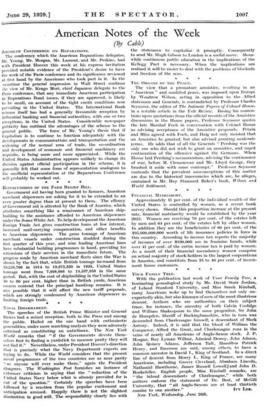THE ORIGINS OF THE PEACE.
The view that a premature armistice, resulting in an " American " and muddled peace, was imposed upon Europe by Woodrow Wilson, acting in opposition to the Allied statesmen and Generals, is contradicted by Professor Charles Seymour, the editor of The Intimate Papers of Colonel House, in a notable article in the Yale Review. Basing his conten- tions upon quotations from the official records of the Armistice discussions in the House papers, Professor Seymour quotes the late Marshal Foch in conversation with Colonel House as advising acceptance of the Armistice proposals. Main and Bliss agreed with Foch, and Haig not only insisted that an Armistice be granted, but also advised granting moderate terms. He adds that of all the Generals " Pershing was the only one who did, not wish to grant an armistice, and urged continuation of the offensive against the Germans. When House laid Pershing's memorandum, advising the continuance of war, before M. Clemenceau and Mr. Lloyd George, they brushed it aside with some contempt." Professor Seymour contends that the prevalent misconceptions of this matter are due to the historical inaccuracies which are, he alleges, contained in Mr. Ray Stannard Baker's book, Wilson and World Settlement.








































 Previous page
Previous page